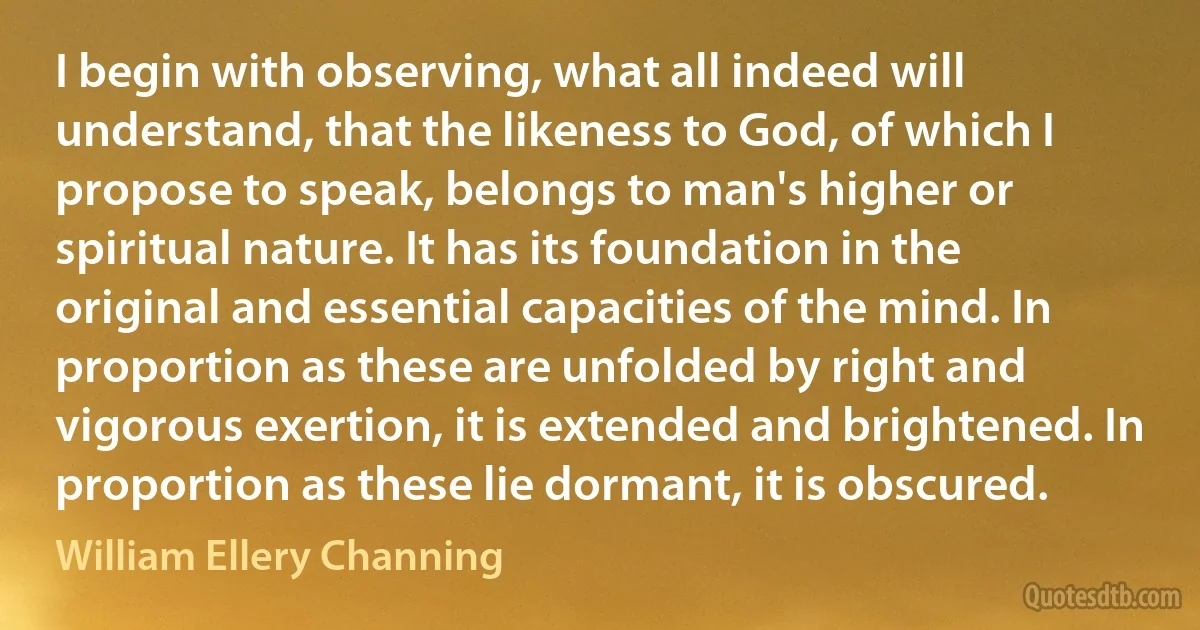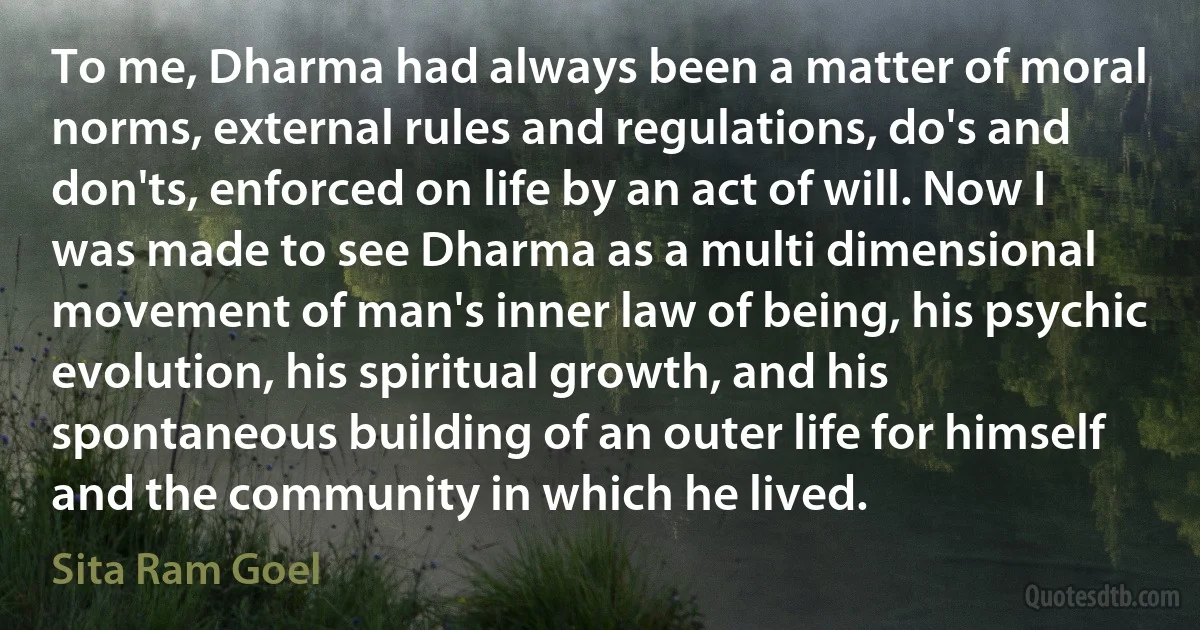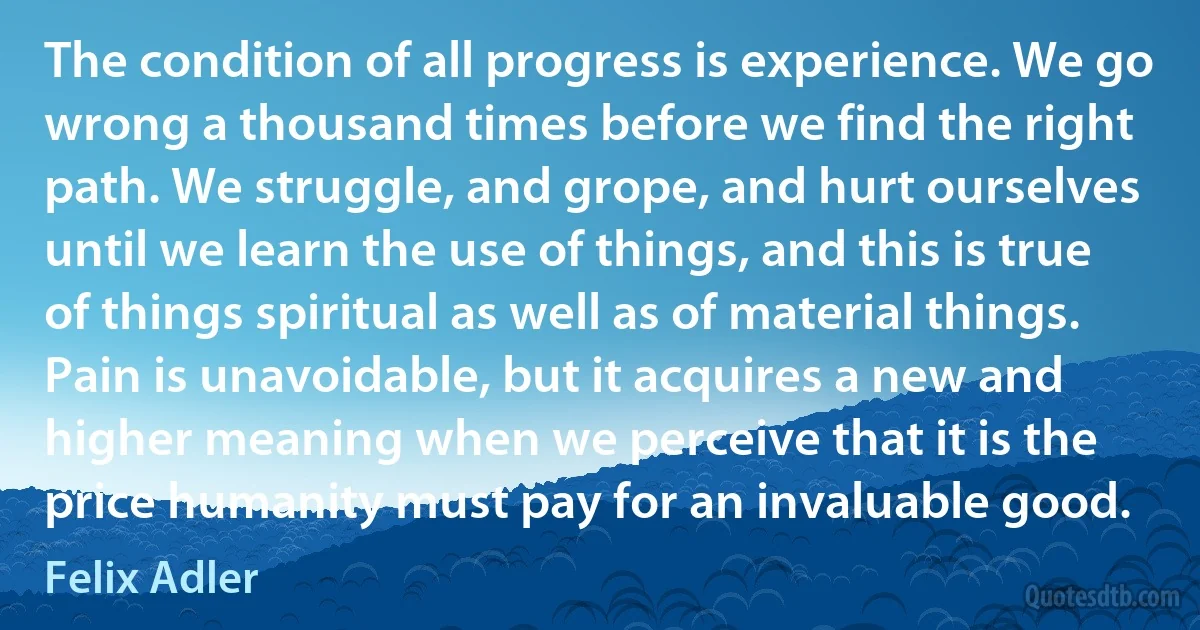Spiritual Quotes - page 71
Books are the true levelers. They give to all who will faithfully use them the society, the spiritual presence, of the best and greatest of our race. No matter how poor I am. No matter though the prosperous of my own time will not enter my obscure dwelling. If the Sacred Writers will enter and take up their abode under my roof, ... I shall not pine for want of intellectual companionship, and I may become a cultivated man though excluded from what is called the best society in the place where I live.

William Ellery Channing
This vast land which Islam has dismembered in due course into the separate states of Afghanistan, Pakistan, Hindustan, and Bangladesh had been a single indivisible whole since times immemorial. Bharatavarsha had been termed by the ancients as the cradle of varNãšrama-dharma, witness to the wheel of the caturyugas, and the kShetra for chakravãrtya, spiritual as well as political. This historical memory and cultural tradition was alive as late as the imperial Guptas. Kalidasa had clothed it in immortal poetry in his far-famed RaghuvaMša.

Sita Ram Goel
I had come back at last, come back to my spiritual home from which I had wandered away in self forgetfulness. But this coming back was no atavistic act. On the contrary, it was a reawakening to my ancestral heritage which was waiting all along for me to lay my claim on its largesses. It was also the heritage of all mankind as proved by the seers, sages and mystics of many a time and clime. It spoke in different languages to different people. To me it spoke in the language of Hindu spirituality and Hindu culture at their highest.

Sita Ram Goel
Gandhi's sarva-dharma-samabhâva did not stop at equal respect for all religions; it went much further and stood for equal validity of all religions. The Mahatma had spared no ink or breath to inculcate the belief that all religions embody the same truths, pursue the same goal, and lead to the same spiritual fulfilment.

Sita Ram Goel
It was this feeling of being at home everywhere in the country which took the Adi Shankaracharya from the southernmost tip to the farthest corners of Bharatavarsha in North and East and West and helped him found (or revive) the four foremost dhãmas at Badrinath, Dvaraka, Rameshvaram and Puri. There is no count of sadhus and sannyasins and house-holders who have travelled ever since on the trail blazed by that great acharya. Six and a half centuries later, Guru Nanak Dev followed in the footsteps of the Pandavas and the Shankaracharya in search of spiritual company.

Sita Ram Goel
The Vedic tradition advises people to be busy with themselves, that is, their own moral and spiritual improvement. Several disciplines have been evolved for this purpose tapas (austerity), yoga (meditation), jñAna (reflection), bhakti (devotion), etc. A seeker can take to (adhikAra) whichever discipline suits his adhAra (stage of moral-spiritual preparation). There is no uniform prescription for everybody, no coercion or allurement into a belief system, and no regimentation for aggression against others. The Biblical tradition, on the other hand, teaches people to be busy with others. One is supposed to have become a superior human being as soon as one confesses the ‘only true faith'. Thenceforward one stands qualified to ‘save' others.

Sita Ram Goel
The idea of a spiritual heart transplant is a vivid image to me; once you have the heart of somebody else inside you, then that heart is there. Jesus' heart is inside me, and my heart is gone. So if God were to place a stethoscope against my chest, he would hear the heart of Jesus Christ beating.

Max Lucado
The peace that passeth understanding is that which comes when the pain is not relieved, which subsists in the midst of the painful situation, suffusing it, which springs out of the pain itself, which shimmers on the crest of the wave of pain, which is the spear of frustration transfigured into the shaft of light. It is upon those we love that we must anchor ourselves spiritually in the last moments. The sense of interconnectedness with them stands out vividly by way of contrast at the very moment when our mortal connection with them is about to be dissolved. And the intertwining of our life with theirs, the living in the life that is in them, is but a part of our living in the infinite manifold of the spiritual life. The thought of this, as apprehended, not in terms of knowledge, but in immediate experience, begets the peace that passeth understanding. And it is upon the bosom of that peace that we can pass safely out of the realm of time and space.

Felix Adler
Spiritual evolution is the progressive advance of mankind toward a state of things in which the light of ethical perfection shall be reflected from the face of human society; that is, in which all men shall live and move and have their being in mutually promoting the highest life of each and all. It means that the object of social reformation shall not be a mere change in the conditions under which men live, but a change in human nature itself. It means that we shall look forward consciously to the breaking forth of new powers in ourselves, to the release, through our own efforts, of capacities dimly latent in us.

Felix Adler
The fact that there is a spiritual power in us, that is to say, a power which testifies to the unity of our life with the life of others, which impels us to regard others as other selves - this fact conies home to us even more forcibly in sorrow than in joy. It is thrown into clearest relief on the background of pain.
In the glow of achievement we are apt to be full of a false self-importance. But in moments of weakness we realise, through contrast, the infinitely superior strength of the power whose very humble organs and ministers we are. It is then we come to understand that, isolated from it, we are nothing; at one with it, identified with it, we participate in its eternal nature, in its resistless course.

Felix Adler
Ethical religion affirms the continuity of progress toward moral perfection. It affirms that the spiritual development of the human race cannot be prematurely cut off, either gradually or suddenly; that every stone of offence against which we stumble is a stepping-stone to some greater good ; that, at the end of days, if we choose to put it so, or, rather, in some sphere beyond the world of space and time, all the rays of progress will be summed and centred in a transcendent focus.

Felix Adler
The advent of Atombomb into a world of varying moral standards and uncertain international friendships has made everyone aware for the first time of the awful fact that, if the world ever lost its spiritual and moral equilibrium, it was now possible completely to eliminate life itself.

Jayachamarajendra Wadiyar
Logic is the science not of external forms of thought, but of the laws of development "of all material, natural and spiritual things", i. e., of the development of the entire concrete content of the world and of its cognition, i. e., the sum-total, the conclusion of the History of knowledge of the world.

Vladimir Lenin



